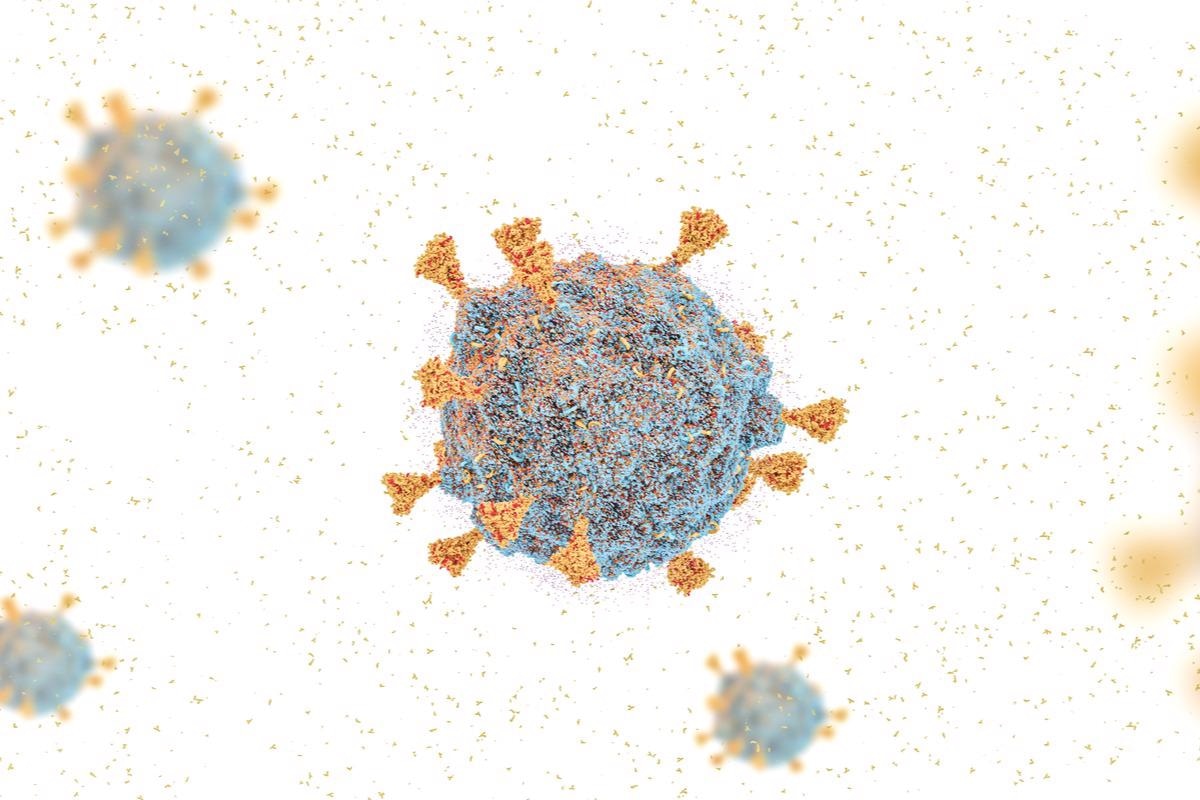The findings further showed that sera samples from severe acute respiratory syndrome coronavirus 2 (SARS-CoV-2)-naïve and two-dose messenger RNA (mRNA)-vaccinated individuals failed to neutralize Omicron in VeroE6 cells, while soluble ACE2/APN01 potently neutralized Omicron infections.
 Study: Clinical grade ACE2 effectively inhibits SARS-CoV-2 Omicron infections. Image Credit: CI Photos/Shutterstock
Study: Clinical grade ACE2 effectively inhibits SARS-CoV-2 Omicron infections. Image Credit: CI Photos/Shutterstock
The emergence of the SARS-CoV-2 Omicron variant has raised concerns due to a large number of mutations in the variant, which confers immune evasion and reduces the efficacy of SARS-CoV-2 vaccines, and neutralizes antibody therapies. The viral Spike protein–human ACE2 interaction is a crucial first step of SARS-CoV-2 infection. Experts believe that Omicron might carry mutations that change its dependency on ACE2 as an entry point, leading to changes in its tissue tropism and infectivity.

 This news article was a review of a preliminary scientific report that had not undergone peer-review at the time of publication. Since its initial publication, the scientific report has now been peer reviewed and accepted for publication in a Scientific Journal. Links to the preliminary and peer-reviewed reports are available in the Sources section at the bottom of this article. View Sources
This news article was a review of a preliminary scientific report that had not undergone peer-review at the time of publication. Since its initial publication, the scientific report has now been peer reviewed and accepted for publication in a Scientific Journal. Links to the preliminary and peer-reviewed reports are available in the Sources section at the bottom of this article. View Sources
Studies have shown that the Omicron variant is more infectious than the other variants and it is spreading rapidly across the globe, accounting for most new cases of COVID-19 in many countries. Therefore, it is important to identify therapies that are effective against the Omicron variant.
The study
In the present study, researchers rendered all prefusion state Spike protein mutations of Omicron in 3D using molecular modeling techniques. The Omicron RBD changes and the location of mutations were further depicted in a 3D model of the SARS-CoV-2 Spike RBD. They also modeled the N-glycosylation sites of the Spike protein previously reported and found that some of the sites - N165, N234, N343 - directly interact with ACE2 or its glycans.
In order to test whether vaccinated sera could neutralize Omicron infections in VeroE6 cells, the authors collected sera from four SARS-CoV-2-naïve, mRNA-vaccinated healthcare workers, 5-7 weeks after the second dose of vaccination.
The researchers had previously reported that clinical-grade soluble ACE2 (APN01) can reduce the SARS-CoV-2 load in VeroE6 cells in a dose-dependent fashion using an early-pandemic reference virus. In the current study, they investigated if APN01 can also neutralize the SARS-CoV-2 Omicron variant by performing neutralization assays in Omicron-infected VeroE6 cells and comparing the results with that of the reference strain.
Results
The study results showed that sera samples collected after the second dose of COVID-19 mRNA vaccination did not show a protective effect against the Omicron variant while they exhibited potent neutralizing activity in VeroE6 cells infected with the reference Wuhan strain. This confirms recent observations by other studies on the limited ability of vaccinated and convalescent sera to neutralize the SARS-CoV-2 Omicron variant.
The researchers found that mutations in the K417N, E484A, Q493R, Q498R, N501Y, and Y505H residues at the RBD directly affected Omicron Spike–human ACE2 binding, leading to greater binding affinity.
Interestingly, the Omicron variant carried mutations at Q498 and Q493, both of which have been reported in mouse-adapted viral strains, including the recently developed maVie16 SARS-CoV-2 strain, which causes severe COVID-19 in mice. Thus, it is possible that Omicron is capable of infecting rodents.
Modeling of N-glycosylation sites of the Spike protein showed that despite the high number of mutations observed in Omicron, no N-glycosylation sites critical for ACE2 binding were altered in its Spike protein. These data obtained through molecular modeling support previous findings showing pre-fusion Omicron Spike protein readily associated with human ACE2.
The experiments in VeroE6 cells showed that clinical-grade recombinant soluble ACE2, which is a drug candidate currently under development, strongly neutralized Omicron in VeroE6 cells with significantly enhanced potency compared to reference isolates of SARS-CoV-2.
Conclusion
The study findings show that the clinical-grade soluble ACE2 effectively inhibits the SARS-CoV-2 Omicron variant, which proves the principle of an effective therapeutic approach against Omicron-driven COVID-19 infections. Along with recent findings showing that ACE2 blocks all known SARS-CoV-2 variants of concern, the results of this study offer a blueprint for a universal agent against COVID-19 with the potential to prevent or alleviate Omicron infections.
APN01 intravenous infusions have undergone phase 2 testing in World Health Organization (WHO) stage 4-6 COVID-19 patients. The authors, working with NIH researchers, have developed an APN01 formulation that can be inhaled as an aerosol to directly interfere with the initial steps of SARS-CoV-2 infection and disease development. The effectiveness of this inhalation approach in offering protection from SARS-CoV-2 infections has been confirmed in mice infected with a SARS-CoV-2 variant that carries two mutations also found in the Omicron variant. Soluble ACE2/APN01 inhalation is currently undergoing phase 1 trials to determine its safety and tolerability.

 This news article was a review of a preliminary scientific report that had not undergone peer-review at the time of publication. Since its initial publication, the scientific report has now been peer reviewed and accepted for publication in a Scientific Journal. Links to the preliminary and peer-reviewed reports are available in the Sources section at the bottom of this article. View Sources
This news article was a review of a preliminary scientific report that had not undergone peer-review at the time of publication. Since its initial publication, the scientific report has now been peer reviewed and accepted for publication in a Scientific Journal. Links to the preliminary and peer-reviewed reports are available in the Sources section at the bottom of this article. View Sources